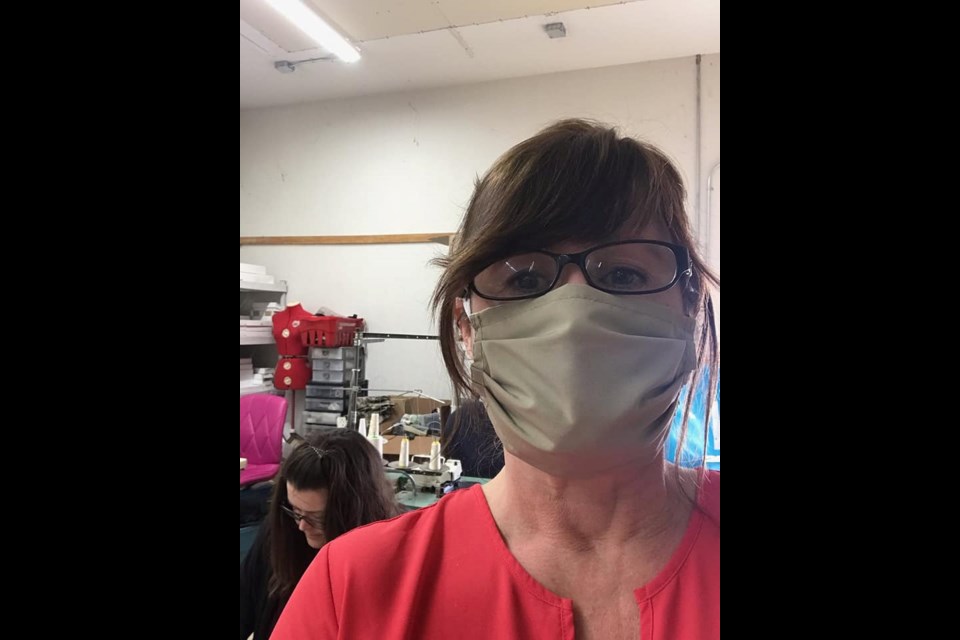Normally at this time of year, Julie Gohm would be ramping up production on The Original Bug Shirt, a product her company’s been fabricating for more than 30 years.
The shirt – manufactured from her Powassan shop, 20 minutes south of North Bay – is popular amongst campers, hikers, outdoor enthusiasts, and travellers as a buffer against the bite of the ever-annoying mosquito.
Its densely woven fabric can’t be penetrated by the whining insect’s proboscis, and customers around the world favour the apparel for its lightweight, chemical-free protection.
But in mid-March, as COVID-19’s creep inched further north, Gohm’s fortunes changed overnight.
With public health units preaching social distancing and self-isolation to contain the rapidly spreading coronavirus, campgrounds remain closed, outdoor trail traffic is sparse, leisure travel has ceased, and the public is being urged to refrain from escaping to their camps and cottages.
“I came in in the morning, and I’m checking my emails, and one of my larger vendors said that they’re going to completely cancel all POs (purchase orders) until June 15,” Gohm said.
“We had literally just shipped them one, but we were working on the second one, and following five weeks of work, were to fill that next order.”
The cancellation represented a loss of more than 50 per cent of The Original Bug Shirt Company’s vendors, a devastating blow.
The impact of COVID-19 on Gohm’s second business, JMI Design Studio, has been equally damaging.
The custom sewing shop, specializing in wedding gowns and bridesmaids’ dresses, saw its business completely evaporate as wedding season dried up. Gohm lost 100 per cent of that business.
She closed her storefront to the public – the first in Powassan to take that measure – and sent all six of her employees home temporarily while she figured out what to do.
Want to read more stories about business in the North? Subscribe to our newsletter.
But despite the personal consequences, Gohm was determined not to sit idly by, and reached out to Nipissing MPP Vic Fedeli to offer her assistance, in whatever way she could, to help the community.
She was at first hesitant when a call came in from Almaguin Highlands Community Living, asking whether she could provide masks and gowns to workers. The non-profit organization provides services and support to people who have an intellectual disability.
“I can’t make the N95 (masks); I don’t have access to that material; I don’t know anything about it,” she said. “I didn’t want to give a false sense of security.”
But after some back-and-forth about specifications and requirements, Gohm agreed to make the masks and gowns consisting of an outer layer of 100 per cent polyester and an inner layer of 100 per cent cotton. Shortly afterward, she delivered 80 masks and 50 gowns to the organization.
Fedeli shared news of her work through his social media channels, and since then, her phone has been ringing off the hook.
Health-care workers, some from as far as British Columbia, are calling to request their own protective masks, while members of the general public seek protection to shield themselves just to do everyday tasks.
Though she isn’t advertising the service, Gohm’s reluctant to turn anyone down.
“The fear is very real,” she said. “It makes me emotional, and it breaks my heart, because I’m having health-care workers call me knowing that these masks are not N95, but it’s better than nothing.”
After moving into a new, larger shop in January, Gohm has the room to continue operations, spacing out employees to accommodate physical distancing measures, and even hire more employees if needed.
Gohm has enough material to keep operations going for a while, and she’s hopeful of recalling her staff in a few more weeks, once she gets a better sense of how this downturn will impact her business.
But in order to expand, she’ll need more machines, and eventually her supply of fabric will run out. Gohm wants to ensure she has the revenue to pay her suppliers and not leave anyone in the lurch.
“When I run out, I run out,” she said. “I had a very good stock, because this is my season, so I had already procured all that kind of stuff. But, depending on where this goes, and how long this lasts, that will eventually end up becoming an issue.”
In more than three decades in business, Gohm acknowledged, she’s seen her share of ups and downs, and more than once has had to quickly shift gears to stay afloat.
But in this unprecedented time of struggle for so many small-business owners, she’s urging people to “think outside the box” and join the effort to help.
Then, when the danger of COVID-19 has passed, Gohm is hopeful that people will recognize the benefit of shopping at home, supporting Canadian businesses like hers, which help strengthen the country’s economy.
“At the end of all this, something different will have come out of it, and the world will have changed,” she said.
“Whatever country they live in, whether it’s Spain, or the U.S., or Canada, or Australia, I hope that people are going to try to buy from their country more.”




